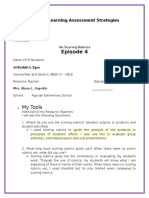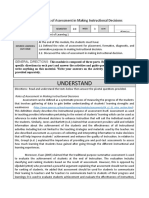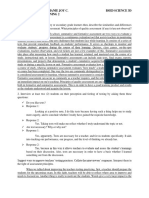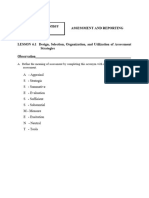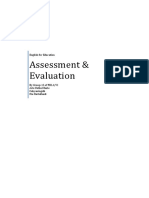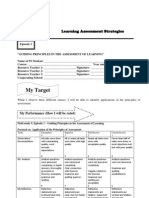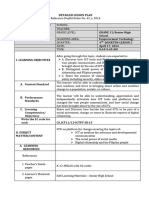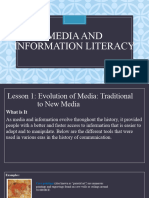0 ratings0% found this document useful (0 votes)
15 viewsExercises 1 and 2
Exercises 1 and 2
Uploaded by
Dorie Fe ManseThe document discusses concepts around assessment and evaluation in education. It provides examples of misconceptions about assessment and asks the reader to rectify the misconceptions in 2-3 sentences. It also includes questions that different stakeholders in assessment may have and asks the reader to identify which stakeholder group each question comes from and how assessment can be used to answer it.
Copyright:
© All Rights Reserved
Available Formats
Download as DOCX, PDF, TXT or read online from Scribd
Exercises 1 and 2
Exercises 1 and 2
Uploaded by
Dorie Fe Manse0 ratings0% found this document useful (0 votes)
15 views2 pagesThe document discusses concepts around assessment and evaluation in education. It provides examples of misconceptions about assessment and asks the reader to rectify the misconceptions in 2-3 sentences. It also includes questions that different stakeholders in assessment may have and asks the reader to identify which stakeholder group each question comes from and how assessment can be used to answer it.
Original Title
Exercises-1-and-2
Copyright
© © All Rights Reserved
Available Formats
DOCX, PDF, TXT or read online from Scribd
Share this document
Did you find this document useful?
Is this content inappropriate?
The document discusses concepts around assessment and evaluation in education. It provides examples of misconceptions about assessment and asks the reader to rectify the misconceptions in 2-3 sentences. It also includes questions that different stakeholders in assessment may have and asks the reader to identify which stakeholder group each question comes from and how assessment can be used to answer it.
Copyright:
© All Rights Reserved
Available Formats
Download as DOCX, PDF, TXT or read online from Scribd
Download as docx, pdf, or txt
0 ratings0% found this document useful (0 votes)
15 views2 pagesExercises 1 and 2
Exercises 1 and 2
Uploaded by
Dorie Fe ManseThe document discusses concepts around assessment and evaluation in education. It provides examples of misconceptions about assessment and asks the reader to rectify the misconceptions in 2-3 sentences. It also includes questions that different stakeholders in assessment may have and asks the reader to identify which stakeholder group each question comes from and how assessment can be used to answer it.
Copyright:
© All Rights Reserved
Available Formats
Download as DOCX, PDF, TXT or read online from Scribd
Download as docx, pdf, or txt
You are on page 1of 2
Name: Score: __________
Course: Date: 03/06/2024
Activity 1: Concept Clarification
A lot has been said and written about assessments in books and journals but there
are some people or even teachers who have misconceptions about the effective use of
assessment in the classroom. Rectify the following misconceptions. Explain in two to three
sentences why they are incorrect.
1. Assessment and evaluation are one and the same.
= When rectifying the following misconceptions, we need to understand first . The
assessment is a way to measure if the learning objectives of a course are being met and
also assessment is valuable for both students and teachers in evaluating progress its
either formative test or summative test. The evaluation is to evaluate the result of all the
assessment was given to the students. The evaluation uses methods and measures to
judge student learning and understanding of the material for purposes of grading and
reporting. Both assessment and evaluation involve the systematic collection and analysis
of data. They aim to measure and evaluate learning outcomes, progress, or program
effectiveness. Both processes require clear objectives and criteria for measurement.
2. Assessment is completed once every grading period.
= Assessment is not completed once every grading period, the main aim and
purpose of it, is to increase and improve the students learning. The goal of assessment
is to improve student learning. Although grading can play a role in assessment,
assessment also involves many ungraded measures of student learning. Summative
assessment takes place after the learning has been completed and provides information
and feedback that sums up the teaching and learning process.
3. Formative assessment is a kind of test teachers use to find out what their
students know.
_______________________________________________________________________
_______________________________________________________________________
_______________________________________________________________________
_____________________
4. Assessment is ultimately for grading purposes.
_______________________________________________________________________
_______________________________________________________________________
_______________________________________________________________________
____________________
5. Student’s work should always be given a grade or mark.
Name: _________________________________ Score: __________
Course: ____________________________ Date: ____________
Activity 2: Key players in Assessment
Below are questions which assessment can address. Determine to which group
(student, teacher, parents, administrators, curriculum supervisor/coordinator, and policy
makers) the question is coming from. Explain briefly how assessment can be used to
answer the questions.
1. Do I have control over my own success?
_______________________________________________________________________
_______________________________________________________________________
_______________________________________________________________________
_______________________________________________________________________
2. Is my teaching strategy effective?
_______________________________________________________________________
_______________________________________________________________________
_______________________________________________________________________
_______________________________________________________________________
3. What curriculum adjustments do we need to make to meet student’s needs?
_______________________________________________________________________
_______________________________________________________________________
_______________________________________________________________________
_______________________________________________________________________
4. Are our students qualifying for college?
_______________________________________________________________________
_______________________________________________________________________
_______________________________________________________________________
_______________________________________________________________________
5. How do we allocate our school resources to achieve success?
_______________________________________________________________________
_______________________________________________________________________
_______________________________________________________________________
_______________________________________________________________________
_______________________________________________________________________
You might also like
- Manual Trimble Gps ScoutDocument102 pagesManual Trimble Gps ScoutEduardo Van Beest Hermse100% (2)
- Femvertising QuestionnaireDocument2 pagesFemvertising QuestionnaireKyleRhayneDiazCaliwagNo ratings yet
- Technical Note of Usp 41 For BalancesDocument2 pagesTechnical Note of Usp 41 For BalancesSamir BoradNo ratings yet
- Theory of EstimationDocument30 pagesTheory of EstimationTech_MX100% (1)
- Assessment in Learning 1Document33 pagesAssessment in Learning 1Lei Andrew BalmacedaNo ratings yet
- Tools For Measurement and Evaluation: Cycle 1Document8 pagesTools For Measurement and Evaluation: Cycle 1Ri ELNo ratings yet
- Sas 3 Edu 535Document6 pagesSas 3 Edu 535Reygen TauthoNo ratings yet
- Template - MC SSE 113 Module 2Document4 pagesTemplate - MC SSE 113 Module 2Zenabi IbañezNo ratings yet
- FS 5 Epsd 4Document6 pagesFS 5 Epsd 4Egca Dihsarla100% (6)
- Assessment in Learning 1 - Edited 3Document53 pagesAssessment in Learning 1 - Edited 3Lei Andrew BalmacedaNo ratings yet
- Task 5: Prof Ed 8 (Assessment and Evaluation of Student Learning)Document2 pagesTask 5: Prof Ed 8 (Assessment and Evaluation of Student Learning)DandyNo ratings yet
- Week 3 AessDocument6 pagesWeek 3 AessCatlen ParungaoNo ratings yet
- Assessment in Learning 1 - Edited 2Document37 pagesAssessment in Learning 1 - Edited 2Lei Andrew BalmacedaNo ratings yet
- 311 AL2 Week 2 Classroom Assessment 1Document8 pages311 AL2 Week 2 Classroom Assessment 1Rellan YbanezNo ratings yet
- Assessment of Learning 1 Learning PacketsDocument40 pagesAssessment of Learning 1 Learning PacketsRosemary SebollerosNo ratings yet
- High Quality AssessmentDocument5 pagesHigh Quality Assessmentshiloh.bantigue14No ratings yet
- Episode 4: My ToolsDocument7 pagesEpisode 4: My ToolsferlitaNo ratings yet
- Chapter 2 Summative Assessment of LearningDocument4 pagesChapter 2 Summative Assessment of LearningAiko Garrido100% (1)
- Week 3 Module PED 6Document7 pagesWeek 3 Module PED 6Danizelle Kaye Cadocoy BernardoNo ratings yet
- My ToolsDocument7 pagesMy ToolsJelly Ann Zacarias DiazNo ratings yet
- EDU431 All in One For MidDocument177 pagesEDU431 All in One For MidKiran ShehzadiNo ratings yet
- LESSON 1 Basic Concepts and Principles in Assessing LearningDocument22 pagesLESSON 1 Basic Concepts and Principles in Assessing LearningRichee LunnayNo ratings yet
- FS 5 Observation SheetsDocument38 pagesFS 5 Observation SheetsKaren Mae Altarejos AlocNo ratings yet
- Evaluating Your LearningDocument7 pagesEvaluating Your LearningHart PigcaulanNo ratings yet
- Assessment of LearningDocument3 pagesAssessment of LearningfloresstephaniejoycNo ratings yet
- Assessment Purposes, Learning Targets, and Appropriate MethodsDocument15 pagesAssessment Purposes, Learning Targets, and Appropriate MethodsJessiah Jade LeyvaNo ratings yet
- 8602 Assignment AnswerDocument16 pages8602 Assignment Answernaveed shakeelNo ratings yet
- Unit 3 Assessment in The Teaching Learning Process PDFDocument20 pagesUnit 3 Assessment in The Teaching Learning Process PDFtamaraNo ratings yet
- Assessment and Evaluation in Social SciencesDocument5 pagesAssessment and Evaluation in Social Sciencesmatain elementary SchoolNo ratings yet
- Acob M 6 CurrAsmt Feb 27Document6 pagesAcob M 6 CurrAsmt Feb 27Joy AcobNo ratings yet
- The Great Plebeian College: Don Reinoso Street, Poblacion Alaminos City, PangasinanDocument15 pagesThe Great Plebeian College: Don Reinoso Street, Poblacion Alaminos City, PangasinanRey Razel CaveNo ratings yet
- Math Module 4-Lesson 1Document6 pagesMath Module 4-Lesson 1Mabel JasonNo ratings yet
- UtsDocument7 pagesUtsAef SaeffullohNo ratings yet
- Aol Lesson 1, Topic 1Document7 pagesAol Lesson 1, Topic 1Nicole Dennise NepomucenoNo ratings yet
- Activity 6 SolomonDocument9 pagesActivity 6 Solomon20bgu1299msNo ratings yet
- Assessment in Life Long LearningDocument10 pagesAssessment in Life Long Learningmailz2yasirNo ratings yet
- Unit 3 Prof Ed 8Document15 pagesUnit 3 Prof Ed 8ardee753No ratings yet
- Learning 6Document7 pagesLearning 6rosalynrendon1004No ratings yet
- Journal EntriesDocument11 pagesJournal EntriesAya Paula SajolNo ratings yet
- Assessment and EvaluationDocument83 pagesAssessment and EvaluationTesfu HettoNo ratings yet
- Module Iv: Assesment and Evaluation: Summary of Learning ActivityDocument25 pagesModule Iv: Assesment and Evaluation: Summary of Learning Activityweby100% (1)
- Report - Classifications of Assessment.Document4 pagesReport - Classifications of Assessment.jyNo ratings yet
- Lesson 2-The Evaluation ProcessDocument43 pagesLesson 2-The Evaluation ProcessMcDaryl MateoNo ratings yet
- Nature of Student AssesmentDocument12 pagesNature of Student AssesmentniantaNo ratings yet
- Written Report PDFDocument7 pagesWritten Report PDFmhytus gregorioNo ratings yet
- TASK 1-Concept Clarification - RechielDocument2 pagesTASK 1-Concept Clarification - RechielRelan MortaNo ratings yet
- 6407 01Document15 pages6407 01Muhammad BilalNo ratings yet
- Introduction To EvaluationDocument9 pagesIntroduction To EvaluationVeronica GuerraNo ratings yet
- Unit 6Document18 pagesUnit 6Keneth NagumNo ratings yet
- Assessment of Learning 1 Prelim To Final ModuleDocument45 pagesAssessment of Learning 1 Prelim To Final ModuleAbdul Nasser BugaNo ratings yet
- Assessment & Evaluation: English For EducationDocument16 pagesAssessment & Evaluation: English For EducationGhina Nur Faridah RahmatNo ratings yet
- Assessmentinlearning1 Lessons1 41 240419065207 0bb1adc9Document165 pagesAssessmentinlearning1 Lessons1 41 240419065207 0bb1adc9amoreslilian121919No ratings yet
- Lesson 3 Educ 30093 2023 For DsedDocument13 pagesLesson 3 Educ 30093 2023 For DsedCharles Janssen Dela PeñaNo ratings yet
- Evaluation: May Cristie A. OrozcoDocument5 pagesEvaluation: May Cristie A. OrozcoSanson OrozcoNo ratings yet
- Assessment of LearningDocument31 pagesAssessment of Learningjerson samillanozamoraNo ratings yet
- Module 2 Assessment PurposesDocument12 pagesModule 2 Assessment Purposesrofelarcon12No ratings yet
- FS 2 Episode 4Document9 pagesFS 2 Episode 4Claire JamitoNo ratings yet
- Test Construction and Alignment With Instructional ObjectivesDocument118 pagesTest Construction and Alignment With Instructional ObjectivesFekadu KorsaNo ratings yet
- Assessment and EvaluationDocument94 pagesAssessment and Evaluationtadessewale39No ratings yet
- Assessment and Evaluation of Learning CommDocument234 pagesAssessment and Evaluation of Learning Commduguma bachaNo ratings yet
- Chapter 1 All LessonsDocument9 pagesChapter 1 All Lessonshermosadareymark282 rmreymark88No ratings yet
- Cep2 Content Module 13Document23 pagesCep2 Content Module 13Melanie TolentinoNo ratings yet
- Field Study 5 Learning Assessment StrategiesDocument24 pagesField Study 5 Learning Assessment StrategiesCA T He68% (74)
- Educational Assessment: Principles and Practices: Innovative Education: Strategies, Challenges, and Solutions in PedagogyFrom EverandEducational Assessment: Principles and Practices: Innovative Education: Strategies, Challenges, and Solutions in PedagogyNo ratings yet
- DLP Detech Q4Document12 pagesDLP Detech Q4Dorie Fe ManseNo ratings yet
- 4 DLP Literature Lesson 3Document5 pages4 DLP Literature Lesson 3Dorie Fe ManseNo ratings yet
- 3 DLP Literature Q3Document8 pages3 DLP Literature Q3Dorie Fe ManseNo ratings yet
- 2 DLP LiteratureDocument8 pages2 DLP LiteratureDorie Fe ManseNo ratings yet
- DLP Etech Q2Document11 pagesDLP Etech Q2Dorie Fe ManseNo ratings yet
- OUTLINE NewDocument9 pagesOUTLINE NewDorie Fe ManseNo ratings yet
- DLP Mil 1quarterDocument12 pagesDLP Mil 1quarterDorie Fe ManseNo ratings yet
- Lesson 3Document2 pagesLesson 3Dorie Fe ManseNo ratings yet
- Q4 Lecture-Lesson 1Document26 pagesQ4 Lecture-Lesson 1Dorie Fe ManseNo ratings yet
- Chapter 5 FinalDocument5 pagesChapter 5 FinalDorie Fe ManseNo ratings yet
- Chapter 2Document20 pagesChapter 2Dorie Fe ManseNo ratings yet
- Q1 Lesson 1. MilDocument26 pagesQ1 Lesson 1. MilDorie Fe ManseNo ratings yet
- 5 Media and Information LiteracyDocument12 pages5 Media and Information LiteracyDorie Fe ManseNo ratings yet
- Lesson 3 Print q1 MilDocument13 pagesLesson 3 Print q1 MilDorie Fe ManseNo ratings yet
- Lesson 7 Q1 Print MilDocument12 pagesLesson 7 Q1 Print MilDorie Fe ManseNo ratings yet
- Nat Questionnaire (Mil) 1-100Document6 pagesNat Questionnaire (Mil) 1-100Dorie Fe ManseNo ratings yet
- Hope 2Document6 pagesHope 2Dorie Fe ManseNo ratings yet
- Media and Information LiteracyDocument9 pagesMedia and Information LiteracyDorie Fe ManseNo ratings yet
- Hope 1Document5 pagesHope 1Dorie Fe ManseNo ratings yet
- 6 Media and Information LiteracyDocument11 pages6 Media and Information LiteracyDorie Fe ManseNo ratings yet
- FDP ConsolidatedDocument14 pagesFDP ConsolidatedArup BaksiNo ratings yet
- JLS 714Document284 pagesJLS 714Mia SamNo ratings yet
- Criteria For Good Research 1Document5 pagesCriteria For Good Research 1Mohammed OmerNo ratings yet
- Statics II Individual AssignmentDocument13 pagesStatics II Individual AssignmentAkmel JihadNo ratings yet
- Coland System Technology, Inc: Cotabato City First Semester, SY 2021-2022Document5 pagesColand System Technology, Inc: Cotabato City First Semester, SY 2021-2022Finance Section DOSDHNo ratings yet
- Kiran - Synopsis - 1Document4 pagesKiran - Synopsis - 1umeshrathoreNo ratings yet
- W3 - Community Diagnosis LectureDocument46 pagesW3 - Community Diagnosis LectureKeziah Mary AbrahamNo ratings yet
- Anthropology Research Grant ProposalDocument8 pagesAnthropology Research Grant ProposaljadelcuevasNo ratings yet
- Building Brand Community: James H. Mcalexander, John W. Schouten, & Harold F. KoenigDocument17 pagesBuilding Brand Community: James H. Mcalexander, John W. Schouten, & Harold F. KoenigDiego RinalloNo ratings yet
- Practical Research 1Document20 pagesPractical Research 1John Nathaniel BarredaNo ratings yet
- VSSA Journal Volume 56 - April 2023Document149 pagesVSSA Journal Volume 56 - April 2023Virginia Social Science AssociationNo ratings yet
- EViews 6.0 BrochureDocument6 pagesEViews 6.0 BrochureJustice MensahNo ratings yet
- Project Rise (Reading Through Interactive and Strategic Exercises) : A Reading Intervention Program To Improve The Comprehension Skills of Struggling Readers at Tuhian Elementary SchoolDocument8 pagesProject Rise (Reading Through Interactive and Strategic Exercises) : A Reading Intervention Program To Improve The Comprehension Skills of Struggling Readers at Tuhian Elementary SchoolPsychology and Education: A Multidisciplinary JournalNo ratings yet
- FDR CallersDocument2 pagesFDR CallersKumar SaurabhNo ratings yet
- Possible Questions and AnswersDocument3 pagesPossible Questions and AnswersJohn Glenn Lausin MaticNo ratings yet
- Community and International NutritionDocument8 pagesCommunity and International NutritiondimasfebrianpNo ratings yet
- Group7 Bsa3l Effectiveness of Accounting Information System Ais To The Management Decision Making in San Fernando PampangaDocument33 pagesGroup7 Bsa3l Effectiveness of Accounting Information System Ais To The Management Decision Making in San Fernando PampangaCristy Martin YumulNo ratings yet
- Summer Training GuidelinesDocument19 pagesSummer Training GuidelinesDeepesh ShenoyNo ratings yet
- Research Proposal. Abong Biclar Delfin Salvador Tamayo and Yap. BSBA 3CDocument33 pagesResearch Proposal. Abong Biclar Delfin Salvador Tamayo and Yap. BSBA 3CEmy Rose N. DiosanaNo ratings yet
- JCR A Sound Idea 2004Document10 pagesJCR A Sound Idea 2004javierNo ratings yet
- Evaluation of Cracks in StructureDocument171 pagesEvaluation of Cracks in StructureSubashini JaganathanNo ratings yet
- Study On Ratio Analysis at TNPL: J. PrabhurajDocument10 pagesStudy On Ratio Analysis at TNPL: J. Prabhurajsakthi priya SNo ratings yet
- Morningness-Eveningness QuestionnaireDocument4 pagesMorningness-Eveningness QuestionnaireSyeda RaihaNo ratings yet
- Self Check 2.1Document2 pagesSelf Check 2.1Emelson VertucioNo ratings yet
- Week 3 HRMDocument6 pagesWeek 3 HRMIsha LarionNo ratings yet
- 1 Introduction To Statistical Quality Control, 7th Edition by Douglas C. MontgomeryDocument17 pages1 Introduction To Statistical Quality Control, 7th Edition by Douglas C. Montgomeryfarazomar.canadaNo ratings yet
















